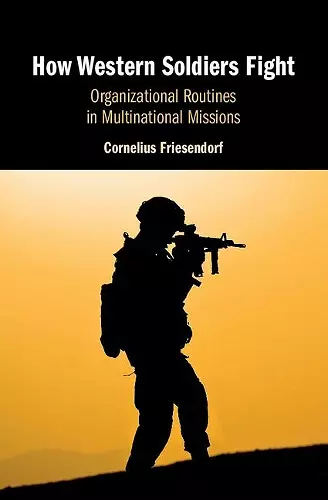How Western Soldiers Fight
Organizational Routines in Multinational Missions
Format:Hardback
Publisher:Cambridge University Press
Published:7th Jun '18
Currently unavailable, and unfortunately no date known when it will be back

This study of military routines is vital for understanding why soldiers from Western democracies participating in multinational missions vary in their use of force.
Reveals that different Western militaries vary in their use of force. Employing the concept of organizational routines to explain such variations, and showing how varying military conduct impacts local populations, this book will interest scholars and students of conflict studies, military studies, international relations and organisation studies.In contemporary missions, soldiers often face unconventional opponents rather than enemy armies. How do Western soldiers deal with war criminals, rioters, or insurgents? What explains differences in behavior across military organizations in multinational missions? How does military conduct impact local populations? Comparing troops from the United States, Britain, Germany, and Italy at three sites of intervention (Bosnia, Kosovo, and Afghanistan), this book shows that militaries in the field apply idiosyncratic organizational routines. Friesendorf uses the concept of routines to explain, for example, why US soldiers are trigger-happy, why British soldiers patrol on foot, and why German soldiers avoid risk. Despite convergence in military structures and practices, militaries continue to fight differently, often with much autonomy. This bottom-up perspective focuses on different routines at the level of operations and tactics, thus contributing to a better understanding of the implementation of military missions, and highlighting failures of Western militaries to protect civilians.
'Why are some militaries better at policing, peace operations and counterinsurgency than others? Looking at how the Americans, British and Germans fared in Bosnia, Kosovo and Afghanistan, Cornelius Friesendorf finds that the answer lies in routines which embody each army's biases and practices. This outstanding book exemplifies the importance of organisational analysis in security studies.' Theo Farrell, Executive Dean of Law, Humanities and the Arts, University of Wollongong, Australia
'This book is a superb example of why we need more micro-level, 'bottom up' analysis in the study of international relations. As Friesendorf persuasively demonstrates in his study of western interventions in war-torn countries, governmental agencies implementing policy - in this case militaries - are not merely tools of grand strategists in distant capitals and headquarters but have agency themselves, and their routine everyday practices should therefore be placed more front and center in our analysis. Only with this type of ground-level work can international relations scholars 'see' the important nuances that are otherwise missed from the armchair grand-theorizing that defines so much of the field.' Peter Andreas, John Hay Professor of Political Science and International Studies, Brown University, Rhode Island
'Anyone wondering why the US Army applied warfighting templates to multinational missions in the Balkans and Afghanistan whereas British soldiers patrolled on foot, Germans stayed inside their camps and Italians prioritized crime-fighting should read this book. Unlike most accounts of military interventions, How Western Soldiers Fight uses micro-level routines and behaviour patterns to reveal what really shapes missions.' Alice Hills, Durham University
ISBN: 9781108429108
Dimensions: 235mm x 157mm x 20mm
Weight: 590g
320 pages